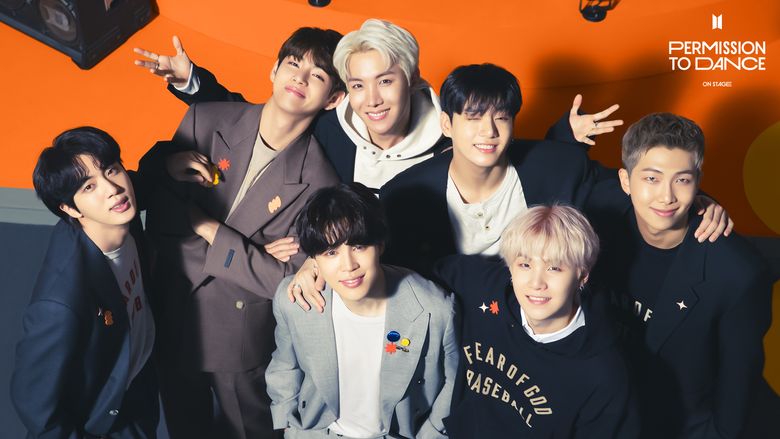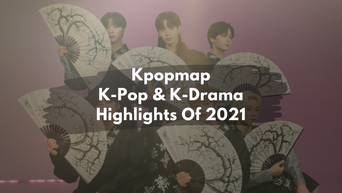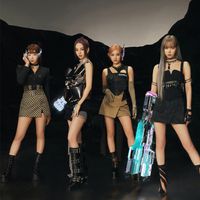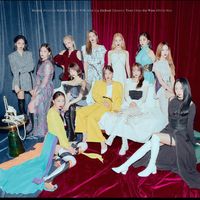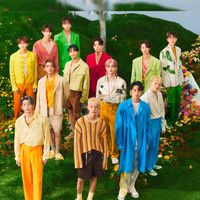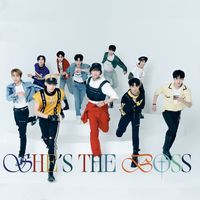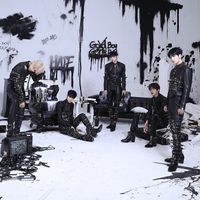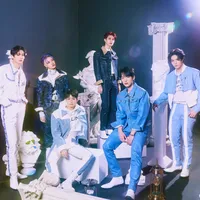2021 was no different as the world tried to adjust to a new way of living. The same goes for the K-Pop world. However, these are not the only changes that the industry saw this year. The industry saw a number of changes from music trends and content sharing, to merchandising methods. Let’s take a look at how K-Pop changed in 2021.
1. Offline/online hybrid concerts, fan meetings, etc.
Whilst 2020 saw K-Pop events mostly moving strictly online, the increase in global vaccination rates and easing of restrictions worldwide made leeway for some offline activity. Whilst most events, concerts, fan meetings, etc. remained strictly online, 2021 saw some K-Pop artists slowly start promoting offline globally again. The industry also become more inclusive. Before, whenever there were online events, K-Pop fans would miss out if they don’t live in that region or were unable to get tickets. However, thanks to the increase in usage of online streaming, most concerts and fan meetings have online streaming options for fans all over the world now. For example, BTS held their “Permission To Dance On Stage” concert in Los Angeles but also held an online concert for the show.
2. The way K-Pop artists share content
Before, K-Pop content was traditionally shared on social media and through fan cafes. 2021 saw a lot of content moving to be shared on fandom platforms (especially exclusive content) such as the app Universe (for artists such as Kang Daniel, WonHo, Park JiHoon, etc.), Weverse (created by HYBE Corporation - featuring artists such as BTS, SEVENTEEN, TXT, etc.), and more. These apps have both free and subscription content on them, changing the way and quality of content that fans can encounter. Some of the apps were already around in 2019, but many of them saw an influx of artists joining the platform in 2021. In some ways, fans are growing dependent on the platforms to connect with artists as they focus more on releasing content there.
3. Major K-Pop entertainment agency changes
Some big changes happened to some famous K-Pop entertainment agencies. The biggest change was how BIGHIT Entertainment changed its name to HYBE Corporation. CEO Bang SiHyuk announced that the name change would be to make the company more inclusive content-wise. The division of HYBE Corporation that handles mainly music is called HYBE Labels which consists of groups that the company acquired in 2020 including KOZ Entertainment (started by Zico), PLEDIS Entertainment (home of SEVENTEEN, NU’EST, etc.), and more. Another change that surprised K-pop fans was the merger between Play M Entertainment (home of VICTON, etc.) and Cre.ker Entertainment (home of THE BOYZ, etc.) to become the company IST Entertainment.
4. Increasing popularity of alternative universes, technology, and AI
Although groups like LOONA, EXO, and more, have had fictional alternate universes since their debuts years ago, 2021 saw an emergence in a lot more alternate universes with words such as ‘metaverse’ becoming buzz words. These alternate universes are usually the backstory behind a certain K-Pop group’s concept and are complex worlds that K-Pop fans can fall into. In 2021, the advancement of technology has taken this to a new level. *A metaverse is a way to make digital environments emulate the physical world, and often incorporates 3D virtual spaces and augmented reality functions (South China Morning Post). aespa (who debuted in Nov. 2020) particularly created a buzz with their alternate universe as it revolves around AI (Artificial Intelligence) and the members’ alternate AI egos. The rise in popularity of these universes has led to many new groups appealing themselves through it and companies using it as a means to expand their artists’ online content. More examples of this are how BLACKPINK’s digital avatars are included in fan events, how Netmarble announced that they would be creating a virtual K-Pop group comprised of 4 AI members called MAVE, and how Cho PD has announced that he is creating a K-Pop group that combines new technologies through experimental content.
5. The emergence of K-Pop cryptocurrency and NFTs
2021 saw the emergence of K-Pop cryptocurrency and NFT trading. An NFT is a non-fungible token that is a unique item (e.g. photos, videos, etc.) that can be traded and bought through blockchain technology (similarly to Bitcoin). It is understood that many companies are going to invest in these markets as a new form of merchandising in the future. JYP Entertainment announced a partnership with Dunamu to produce an NFT platform dedicated to K-Pop in 2021. Groups such as A.C.E have even already launched NFT products. Many artists and companies launched NFT products or announced plans to launch them in 2021. There is, however, a debate surrounding the ethics behind the production and selling of NFTs amongst K-Pop fans.
6. Takeover of the 4th generation of K-Pop and TikTok
The 4th generation of K-Pop is considered to be groups that have debuted from 2018 until now. There is no doubt that the 4th generation of K-Pop has a distinct style and sound. While groups in the 2nd and 3rd generation are still holding their own and shining in the industry, there is no doubt that the 4th generation is extremely dominant when it comes to trends in the industry. This includes how 4th generation K-Pop groups have set trends such as TikTok dance challenges, for example. In fact, TikTok reported that the number of TikTok videos with K-Pop content tripled to more than 97 million videos in September 2021 compared to 33.5 million in 2019 (Bandwagon Asia). For example, STAYC has been recognized throughout 2021 as one of the groups that had thousands of fans doing one of their dance challenges through their songs ‘ASAP’ and ‘STEREOTYPE’.
♬ ASAP - STAYC Did you notice any other changes in the K-Pop world this year? Do you have any predictions for how the K-Pop industry will look in 2022? Let us know in the comments. Kpopmap K-Pop & K-Drama Highlights of 2021 Kpopmap Highlights 2021|Dec 2, 2021

